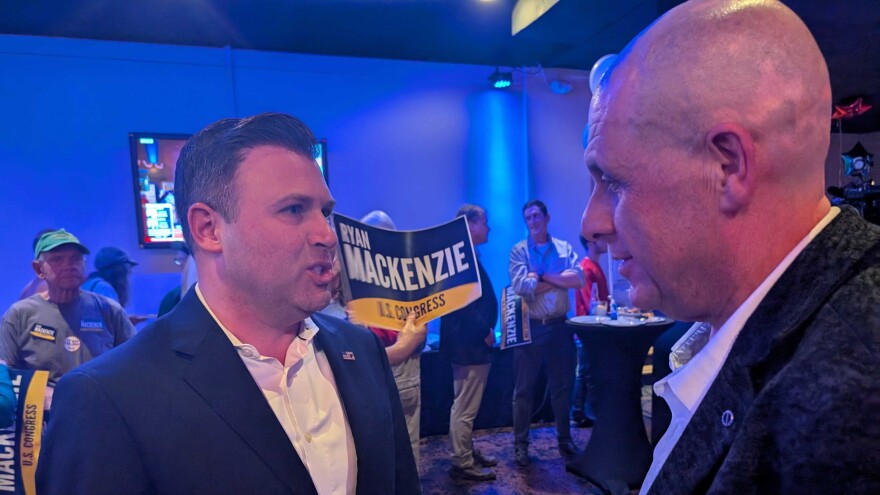WASHINGTON, D.C. — The Lehigh Valley's newly elected congressman anticipates the incoming Trump administration and Republican Congress will examine recent federal spending packages with an eye toward pulling back funding for projects and policies approved by the outgoing Biden administration.
Republicans on the campaign trail this year pinned the high costs of everyday goods on President Joe Biden and Democrats.
U.S. Rep.-elect Ryan Mackenzie, R-Lehigh Valley, and others argued massive spending projects such as the Inflation Reduction Act drove up inflation that hamstrung working families across the nation.
Mackenzie, who is scheduled to take the oath of office Jan. 3 at the U.S. Capitol in Washington, said President-elect Donald Trump and the new Republican-led Congress will explore axing some of these programs as a way to lower federal spending.
However, it's likely many of the programs have advanced far enough that the federal government may be contractually obligated to see them through, he said.
"If there are unexpended funds, things that have not been committed and not been already allocated, we would certainly want to look at those things," Mackenzie, 42, said in an interview with LehighValleyNews.com.
"Illegal immigration has put stressors on our system and the costs and burdens in our local communities. Many of these things are all intertwined, so you have to look at them in a big-picture sense."U.S. Rep-elect Ryan Mackenzie, R-Lehigh Valley
He could not provide examples of what funding may be pulled, saying it would be done on a case-by-case basis.
"As a representative for our district, I'll want to look at, maybe, who has been applying for certain programs — how those funds would be used if they had been approved. We do want to make sure that the priorities and that the things we want to be achieving, not only as a country but in our local community, are met," Mackenzie said.

Local projects
Federal debt stood at $35.9 trillion as of Saturday. Interest payments on debt account for $77 billion of spending so far this fiscal year — more than federal spending on agriculture, transportation, social services and veterans benefits combined, according to the U.S. Treasury website.
The Lehigh Valley has been a recipient of some of those federal spending packages approved under the Biden administration. Allentown recently accepted a $20 million "Recompete" grant intended to improve transportation and child care options for residents in some of the city's poorest neighborhoods.
The Biden administration also agreed to a preliminary $93 million deal with Infinera that would create a semiconductor assembly plant in South Bethlehem. Infinera already operates a facility in Upper Macungie Township where microchips manufactured in San Jose are encased in specialty casing for high-end electronics and fiber optic networks.
Funding for both projects stems from the bipartisan CHIPS and Science Act.
The law was intended to boost the production and workforce for essential products such as pharmaceuticals, semiconductors and quantum computing, among other fields. Federal lawmakers and others said the COVID-19 pandemic created supply chain problems that showcased how a lack of stateside manufacturing of these products posed a national security threat.
Energy policy, border security
Mackenzie said the new Republican majority will prioritize reforming the nation's energy policy and border security. Both efforts, he said, will lead to improvements in the economy.
Last year, Republicans attempted to boost the production of oil, natural gas and coal and roll back Biden-approved efforts to convert the nation to renewable energy. Those efforts were blocked by the Democratic-controlled Senate, but that's unlikely to be a problem in 2025.
Republicans argue that a boost to the domestic energy industry would lower costs across the board for everyday Americans.
Immigration reform, Mackenzie said, would also produce savings. The surge in immigrants illegally entering the country has gobbled up resources. Groups that don't normally assist these clients have been forced to respond, leading to other organizations to either step up and fill the gap or leave more people falling between the cracks.
"Illegal immigration has put stressors on our system and the costs and burdens in our local communities," Mackenzie said. "Many of these things are all intertwined, so you have to look at them in a big-picture sense."

Support for Johnson, aspects of Obamacare
A state representative for 12 years, Mackenzie is about a week into his U.S. House orientation, where first-time members are trained on how to build a staff and operate their offices.
Come January, they and returning members will be tasked with electing a speaker of the House. In 2022, that turned into a fiasco when then-Republican Majority Leader Kevin McCarthy couldn't wrangle enough support until four days later. The failure to unite the Republican caucus foreshadowed McCarthy's retirement and a session marked by unusually high gridlock.
Mackenzie was optimistic that Speaker Mike Johnson, R-La., will reclaim his gavel. Johnson made multiple appearances with Mackenzie in Pennsylvania's 7th Congressional District in the final weeks of the campaign, including greeting voters outside a Bethlehem Township polling place on Election Day.
"He has done a great job for the Republican caucus. He's been a very steady hand at the wheel," Mackenzie said. "We're going through some really difficult times in our country — very challenging legislative and political environment — and so I think he's proven himself in the past couple of months in that position."

During a Bethlehem campaign stop with Mackenzie in October, Johnson said Republicans would look to enact a major overhaul to health care should they win the majority. Mackenzie said that he was unsure what Johnson meant and hasn't seen any proposed legislation that would alter the Affordable Care Act.
Mackenzie, who us wrapping up his run as a state lawmaker representing part of Lehigh County, said he would support legislation that would improve the Affordable Care Act on the margins.
He said Congress would be wise to examine ways to create transparency around pharmacy benefit managers, the businesses that negotiate prices between drug manufacturers and pharmacies.
Rising drug costs have forced hundreds of rural pharmacies to close in Pennsylvania in recent years, leading to higher costs for consumers.
Mackenzie supported bipartisan legislation, signed into law by Gov. Josh Shapiro this summer, that requires PBMs operating in the Keystone State to offer more transparency about rebates and payments they receive from drug manufacturers.
"I'm glad we were to do that in a bipartisan fashion Pennsylvania, and hopefully we'll be able to take up something like that at the national level as well," Mackenzie said.
As proof of his support of some ACA provisions, he pointed to votes he made this fall that would enshrine some of the federal law's provisions at the state level.
In September, Mackenzie voted for bills that would prevent insurers from denying Pennsylvanians coverage for pre-existing conditions, allow adult children to stay on their parents' health insurance and forbid insurers from enacting annual or lifetime caps on insurance payouts for essential care.
Mackenzie defeated three-term Democratic incumbent Susan Wild in the 7th Congressional District by about 4,400 votes, or about 1 percentage point.
The district is one of the most contested battlegrounds in the country, and House Republicans made flipping the district one of their top priorities.
PA-7 represents all of Carbon, Lehigh and Northampton counties plus a sliver of Monroe County.


